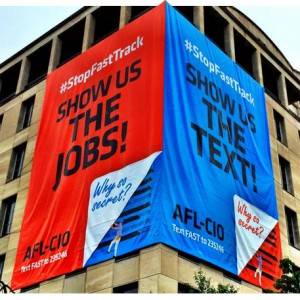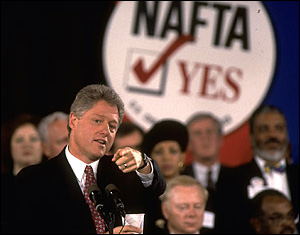NATIONAL
We’ve heard this before: ‘Trust me’ on trade
By DAVID GROVES
The Stand
WASHINGTON, D.C. (June 4, 2015) — President Barack Obama is engaged in a full-court press to convince members of the U.S. House of Representatives to support his trade agenda and grease the skids for more NAFTA-like trade deals. This week, Obama granted an “exclusive interview” to KING-TV’s Dennis Bounds — one of many he is conducting for local TV news stations across the country — to make his arguments in favor of passing “Fast Track” Trade Promotion Authority for himself and for the next president.
President Obama’s message continues to be “trust me.”
The president insists the Trans-Pacific Partnership (TPP) is the most progressive trade deal ever negotiated and that it includes enforceable labor and environmental standards, but he refuses to allow the public to look at it until after Congress approves Fast Track, which would take away their ability to change or amend the TPP.
 The absurd lengths to which the White House has gone to keep the TPP a secret — only members of Congress (not their staff) may see it, but they can’t talk about what they’ve seen or take any notes — has eroded congressional support for Fast Track, according to Politico. This week, WikiLeaks offered a $100,000 bounty to anyone who will send them the text so they can make it public.
The absurd lengths to which the White House has gone to keep the TPP a secret — only members of Congress (not their staff) may see it, but they can’t talk about what they’ve seen or take any notes — has eroded congressional support for Fast Track, according to Politico. This week, WikiLeaks offered a $100,000 bounty to anyone who will send them the text so they can make it public.
“If the TPP is so clearly in the best interests of the American people, as the president says, why the big secret?” asks Jeff Johnson, President of the Washington State Labor Council, AFL-CIO. “The White House says the secrecy is necessary to keep our bargaining positions and strategies secret from the nations we are negotiating with, but after five years of talks, the negotiators themselves say the TPP is almost complete. So again, if it’s so great, why can’t we see it?”
“The public is skeptical with good reason,” Johnson adds. “We have 30 years of experience with broken promises that these deals will create jobs and improve our standards of living when instead only big corporations and the extremely wealthy have benefited. These trade deals have cost Americans good-paying jobs and suppressed our wages, leading to historic income inequality. So you’ll excuse us if we’re skeptical that the latest deal — which we aren’t allowed to see — will be any different.”
If President Obama’s “trust me” assurances on KING-TV about strong labor and environmental protections sound familiar, it’s because they are:
 ► “The North American Free Trade Agreement [NAFTA] is the first agreement that ever really got any teeth in environmental standards, any teeth in what another country had to do with its own workers and its own labor standards… There’s never been anything like this before.” — Bill Clinton, 1993
► “The North American Free Trade Agreement [NAFTA] is the first agreement that ever really got any teeth in environmental standards, any teeth in what another country had to do with its own workers and its own labor standards… There’s never been anything like this before.” — Bill Clinton, 1993
► “CAFTA has the strongest labor and environmental provisions of any trade agreement ever negotiated by the United States. CAFTA is light years ahead of NAFTA, more practical and effective than current law, and is far stronger than earlier agreements.” — Rob Portman, U.S. Trade Representative under George W. Bush, 2005
► [The Peru, Colombia, and Panama trade agreements] “have unprecedented protections for labor rights and environmental standards.” — Susan Schwab, U.S. Trade Representative under George W. Bush, 2007
► “This [Korea Free Trade] agreement includes groundbreaking protections for workers’ rights and for the environment. In this sense, it’s an example of the kind of fair trade agreement that I will continue to work for as president, in Asia and around the world.” — Barack Obama, 2010
► “This [TPP] will end up being the most progressive trade bill in history. It will have the kinds of labor and environmental and human rights protections that have been absent in previous agreements.” — Barack Obama, 2015
Meanwhile, as the president touts strong labor standards in the TPP that he assures us will “level the playing field for American workers,” his administration is working behind the scenes to soften anti-slavery language in the Senate-approved Fast Track bill. The White House is doing this so Malaysia, a notorious hub for human trafficking, won’t be excluded from the TPP. This raises the question, how can American workers possibly “compete” (in terms of labor costs) with slaves?
To their credit, KING-TV did counterbalance the president’s familiar trade pitch with some reality as experienced by a worker here in Washington state who lost his job as part of the fallout from previous free trade deals.
In 2009, Brad Pierog was laid off from his job at the Weyerhaeuser mill in Aberdeen in what the federal government certified to be a trade-related plant closure. Thanks to federal retraining benefits he received as part of the Trade Adjustment Assistance program, Pierog now works as an IT Specialist at the state Department of Revenue. But he is one of the lucky ones.
“I know guys who lost their jobs in 2009 when Weyerhaeuser went down who still haven’t found work,” Pierog told KING-TV.





